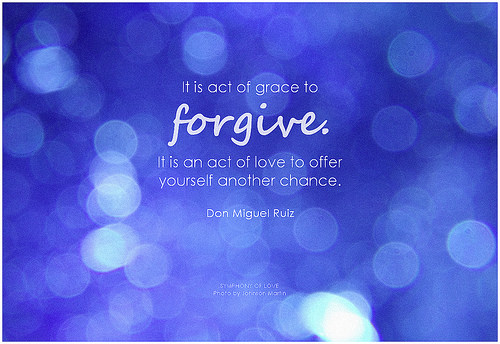
It is inevitable that your spouse will disappoint, offend, or hurt you with their actions or words. At that moment, even knowing the power of grace, it may feel difficult to to forgive. Let me assure you that forgiveness is not only necessary for a healthy marriage, it is absolutely achievable.
“A major misconception, one that derails the forgiveness process, is that forgiving means forgetting.”
A major misconception, one that derails the forgiveness process, is that forgiving means forgetting. Nothing could be further from the truth. Forgiving a wrong done to you is absolutely possible, while forgetting the wrong done is highly improbable.
Rather than thinking of forgiving as forgetting, it is better to think of forgiving as extending grace to another person. In essence, when I forgive, I am letting the other person off the hook (extending grace). I am giving up my right to demand retribution. I am letting the matter go. This doesn’t mean that I don’t remember or that I forget that a wrong was done. On the contrary, the fact that I remember what was done and still extend grace is what makes the act of forgiving so powerful.
The Steps of Forgiveness
Own your feelings
You’ve been wronged. There is pain as a result of the wrong done. Own that truth. When we sin against God, He doesn’t act as though we didn’t sin. He doesn’t act as though our sin doesn’t cause Him pain. It is no different with us. In fact, to act as though you were not injured will stop the forgiveness process in its tracks. If you weren’t injured, then there is nothing to forgive. Friends, family, maybe even your spouse, will say get over it. You are right to feel hurt after being wronged!
If Needed, Share your feelings
If needed? Yes. If you want to share with your spouse what has been done to hurt you, then do so. It is part of growing in your communication with each other. Articulating what has happened, and how it affect you, can go a great way in helping the healing process, leading to reconciliation and restoration. But, sharing your feelings is not necessary for forgiveness. Why? Because even if you don’t share your feelings, even if the conversation never occurs, you’re still obliged to forgive! Even so, I’d encourage couples to always talk the matter through and share their feelings.
Let It Go
By let it go, I mean give up the notion to make the other person pay. You know what I’m talking about. That feeling that comes when you’ve been wronged. The unspoken prayers to God to get them on your behalf, so that they know how it feels. The plans for payback that you’ve been thinking of.
Move Forward
Once you’ve let go of your right to retribution, now you can work toward restoration. If you find yourself still thinking of getting even, still dwelling on the wrong done, contemplate whether you’ve actually forgiven. Go back through the prior steps if you must.
If you find yourself on the other side of the equation, having hurt your spouse either intentionally or unintentionally, put yourself in their shoes. Confess, repent, ask for forgiveness, and allow your spouse the opportunity to go through the steps outlined above. Forgiveness can be powerful in our lives, and can transform your marriage.
- Part 1 – Introduction
- Part 2 – Selfishness Has No Place in Marriage
- Part 3 – It All Begins with Commitment
- Part 4 – You’ve Got to Talk A Lot, About Everything
- Part 5 – The Difference Between Just Hearing and Really Listening
- Part 6 – Say What You Mean
- Part 7 – Real Love Never Ends
- Part 8 – Learn How to Fight to Win
- Part 9 – Grace and Forgiveness Are A Must
- Part 10 – The Power of Grace in Marriage